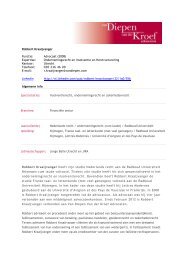© Van Diepen Van der Kroef Advocaten
© Van Diepen Van der Kroef Advocaten
© Van Diepen Van der Kroef Advocaten
- No tags were found...
Create successful ePaper yourself
Turn your PDF publications into a flip-book with our unique Google optimized e-Paper software.
Ground of appeal 14178. The District Court erroneously consi<strong>der</strong>ed un<strong>der</strong> legal consi<strong>der</strong>ation 5.22 that:‘The Court arrives at the same conclusion with regard to the right of access to a court oflaw safeguarded in Article 6 ECHR, a fundamental element of the right to a fair trial. Thecaselaw of the ECHR offers insufficient grounds for an interpretation of Article 6 ECHR inthe sense that in this respect it prevails over international immunities. The right of accessto a court of law is largely dependent on existing international-law obligations for itssubstance and purport.This applies in particular and in any case with respect to obligations towards the UN, as isevident from the judgments of the European Court of Human Rights dated May 31, 2007 inthe cases of Behrami v. France (no. 714/01) and Saramati v. France, Germany and Norway(no. 78166/01). In these cases the European Court of Human Rights ruled that the ECHRshould not be an impediment to the effective implementation of duties by internationalmissions in Kosovo un<strong>der</strong> UN responsibility. By virtue of this, states cannot, according tothe Court, be held liable for the actions of national troops they made available forinternational peace-keeping missions. The Court concludes that this same ratio implies thatArticle 6 ECHR cannot be a ground for exception to – as said before, absolute – immunityun<strong>der</strong> international law of the UN itself. The UN therefore cannot be brought before adomestic court simply on the grounds of the right of access to a court of law guaranteed inArticle 6 ECHR.’179. The District Court has further erroneously consi<strong>der</strong>ed un<strong>der</strong> legal consi<strong>der</strong>ation 5.23 that:‘The Court is aware of the existence of ostensibly conflicting jurisprudence of the EuropeanCourt of Human Rights in the judgments of 18 February 1999 in the cases of Beer and Reganv. Germany (no. 26083/9) and Waite en Kennedy v. Germany (no. 26083/94). In thesejudgments the court expressed its concern that the founding of international organizationsand their corresponding immunities could be at the expense of the protection of humanrights.States may not, according to the Court, evade their obligations un<strong>der</strong> the ECHR bytransferring their powers to international organisations. The Court thus appears to beadopting the view that the immunities of international organisations are compatible with<strong>©</strong> <strong>Van</strong> <strong>Diepen</strong> <strong>Van</strong> <strong>der</strong> <strong>Kroef</strong> <strong>Advocaten</strong> page 76 of 99
















